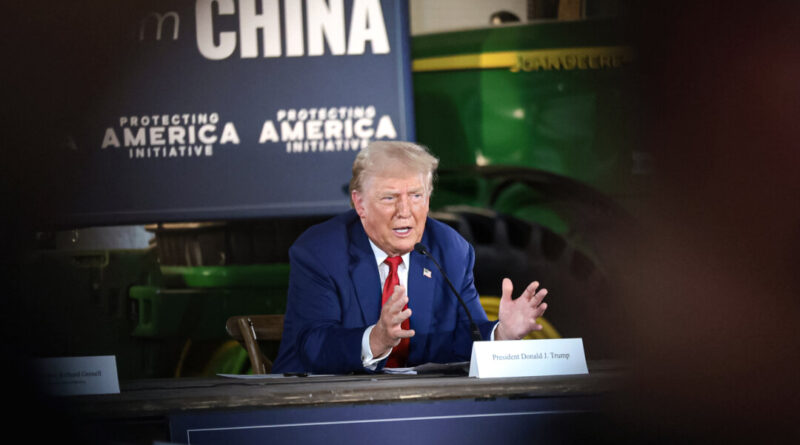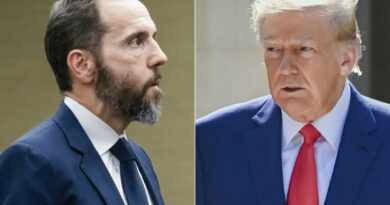Expecting the US to Intensify its Confrontation with the CCP Threat under Trump 2.0
News Analysis
WASHINGTON—President-elect Donald Trump is set to escalate deterrence against communist China’s aggression during his second term.
The first Trump administration steered U.S.–China relations away from partners to strategic competitors. It began restricting China’s access to U.S. semiconductor technology and capital and identified the Indo–Pacific region as the priority theater for the United States, a trajectory that the Biden administration continued.
By the end of his first term, Trump experienced first-hand the result of placing trust in the communist regime. The United States was hit hard by the COVID-19 pandemic, borne from an outbreak in China that was covered up by the Chinese Communist Party (CCP). The January 2020 phase one trade deal with China to rebalance the trade deficit went largely unfulfilled.
On Nov. 16, at his last official meeting with President Joe Biden, CCP leader Xi Jinping said he was ready to work with the incoming Trump administration. “China’s goal of a stable, healthy, and sustainable China–U.S. relationship remains unchanged,” Xi said.
When congratulating Trump on his reelection recently, CCP leader Xi Jinping said that the two countries will stand to “gain from cooperation and lose from confrontation.”
Experts say to expect confrontation.
Australia-based former Peking University law professor Yuan Hongbing used to be Xi’s drinking buddy during the 1980s when Xi was the deputy mayor of Xiamen in the coastal Fujian Province. Yuan told The Epoch Times that Xi and Trump’s “conflict of fate” is “inevitable.”
Yuan said Xi is determined to revive the international communist movement and dominate the future of mankind in the name of communism—what Xi calls the “community of common destiny,” which is strategically in conflict with Trump’s ideal of “making America great again.”
While Xi has long advocated that the United States and China could “coexist peacefully,” Yuan said these remarks reflect the CCP’s nature—saying nice things in public while doing harm in practice.

David Arase, a professor of international politics at the Johns Hopkins University’s Hopkins-Nanjing Center for Chinese and American Studies in China’s Nanjing city, likened Xi’s statement to a Chinese expression about two tigers: one in charge of the east mountain and the other presiding over the west mountain.
“But we’re in a globalized world. The world doesn’t divide that way anymore,” he said, calling the Chinese approach “fundamentally anachronistic.”
“The U.S. is not going to just say: ‘Okay, well, I guess we’ll just leave all our investment, trade, and security interests in Asia and give it over to you because you deserve it. We’ll settle here in the Western Hemisphere,’” Arase told The Epoch Times. “I don’t think it’s going to work that way.”
Fundamental Conflict of Economic Interest
Since Trump left the White House in January 2021, the competition landscape of the United States and China has shifted.
The United States has been dealing with high inflation domestically and is stretched thin from providing military aid to Ukraine and Israel in the two regional wars.
In China, the pandemic exacerbated the decade-old problems with the country’s debt-fueled economic growth model. Market analysts say the world’s second-largest economy is expected to miss its 5 percent target this year despite releasing stimulus packages of more than $2 trillion since Sept. 24.
During the Biden administration, Chinese production subsidized by Xi’s 10-year industrial “Made in China 2025” policy ramped up significantly.

On Oct. 22, U.S. Treasury Secretary Janet Yellen said that China’s stimulus packages didn’t boost domestic spending and hence didn’t address the overcapacity issue. She has repeatedly raised the issue of China’s associated dumping with the rest of the world.
China’s overcapacity remains a fundamental conflict of interest between the two countries, according to Nick Iacovella, senior vice president at the Coalition for a Prosperous America (CPA), an advocacy organization exclusively representing manufacturers that have productions in the United States.
“We have tried to negotiate with China. It does not work, and frankly, it will never work because of the fundamentals of their economy. It has nothing to do with diplomacy,” he told The Epoch Times.
“The Chinese Communist Party just cannot afford to rein in their overproduction. It’s the only way they’ve stimulated economic growth across the country.”
Exports have remained one of the few bright spots of the Chinese economy. In October, exports grew by 12.7 percent year over year, the fastest in 27 months. This increase was largely due to importers stockpiling goods in anticipation of a tariff hike, as many expected that Trump would be reelected.
During his first term, Trump waged a nearly two-year-long trade war with China, using tariffs as one of the main negotiation levers. In 2020, the two countries reached a phase one trade deal in which China agreed to purchase an additional $200 billion in U.S. products over two years. Beijing did not fulfill its pledge.
While campaigning with farmers in Smithton, Pennsylvania, a borough near Pittsburgh, on Sept. 23, Trump said that, if reelected, his first call would be to Xi, asking him to honor the deal.


 Source link
Source link


